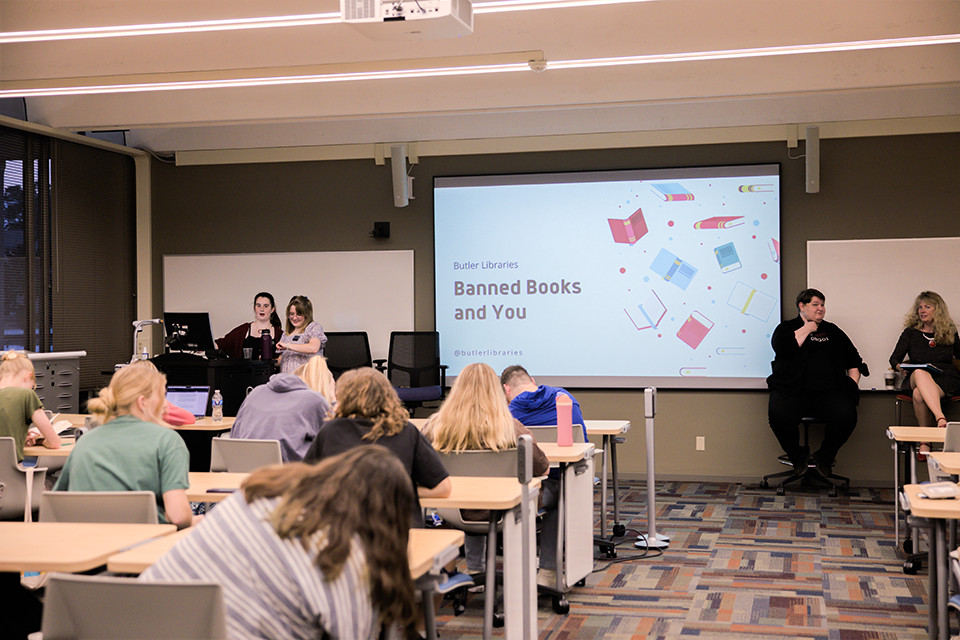Students listen in on an educational panel on book banning organized by Butler Libraries. Photo by Terry Ngai.
MAIRIN MCCARTHY | STAFF REPORTER | mkmccarthy@butler.edu
“Banned Books and You” — a panel on the issue of censorship and importance of expression in literature — gave students the chance to hear from experts about their views on such issues. Performing and Visual Arts Librarian Sarah Ward, lecturer of English Bryce Berkowitz and Kurt Vonnegut Museum and Library CEO Julia Whitehead gathered in Irwin Library on Sept. 21 to draw attention to how the censorship of literature has been used by government systems all around the world to silence opposing or controversial views or protect citizens from detrimental ideals and propaganda.
About 1,500 books were banned by public schools in the United States in the first semester of the 2022-23 school year. This figure has surpassed any previous guideline on student literature that the U.S. has seen and shows no sign of stopping.
The works being censored are often labeled as “harmful” and “explicit.” Themes of sexual orientation, gender, race and other seemingly controversial matters are common topics that are often framed as inappropriate for audiences, particularly children.
Butler students interested in combatting and spreading awareness of this issue were able to ask panelists questions as well as listen in on how these book bannings affect the speakers professionally.
Julia Whitehead is well-versed in the importance of historical literature and its impact on shaping young minds. Whitehead brought her expertise to the event in a way that targeted the importance of preventing book banning.
“When people ban books or challenge books, it is a kind of violence,” Whitehead said on the panel. “Hurt people hurt people. And if you are trying to take away someone’s right to read, that’s a way of trying to hurt them.”
Book bans are sprouting up all over the U.S., including in Butler’s own backyard. East Hamilton Public Library (EHPL), which has library systems in Fishers and Noblesville, has reportedly taken books off the shelves of young adult sections that contain nudity, drug use, violence and other controversial topics.
This regulation stems from a policy recently approved by the library board. John Green, author of “Looking for Alaska”, one of the many books prohibited from the EHPL, called this mandate of teen literature an “embarrassment” and criticized the over-sheltering of adolescents.
It will cost these local library systems upwards of $300,000 to reprocess around 18,000 books on top of their other staff duties. Not only does this mean less access to materials, but less access to librarians who are being refocused on examining these literary works.
Junior English major Miranda Emerick was motivated to organize the event by her aversion to the restriction of famous works in academic spaces as well as her overall passion for public writing.
“There is an issue of wanting to further taboo these stories and make them more of an issue than they are,” Emerick said. “It’s becoming more of a problem, and we’re starting to see specific identities being erased.”
Impactful works of literature like “The Giver” by Lois Lowery, “The Hate U Give” by Angie Thomas, “Perks of Being a Wallflower” by Stephen Chbosky and “13 Reasons Why” by Jay Asher, along with hundreds of other titles, have been deemed inappropriate for the developing minds of America.
Educators on campus are also voicing their opinions on this issue. Panelist Bryce Berkowitz believes that students should be allowed to access any literature regardless of their content.
“People in positions of power telling others what to do, it’s a kind of silencing,” Berkowitz said on the panel. “Saying ‘That’s not appropriate,’ and ‘What you’re doing is not okay’ when in fact it is okay.”
The third panelist Sarah Ward highlighted that book banning is geared towards restricting free thinking in academic spaces.
“I think a goal of censorship is to make you start to limit your own exploration of knowledge and limit your own expressions,” Ward said on the panel. “It’s one thing to be told by a community or government that you cannot do something, and it’s another thing to impose that on yourself.”
To spread awareness on this issue, Irwin Library has a table set up at its entrance with information on banned books to keep students informed about literary restrictions.
Panel members emphasized the importance of literary freedom and how regulation only sets individuals back in their educational development. Being exposed to unknown ideas pushes learners to expand their boundaries of what they know, and these ideas have a right to reside in scholastic spaces.



